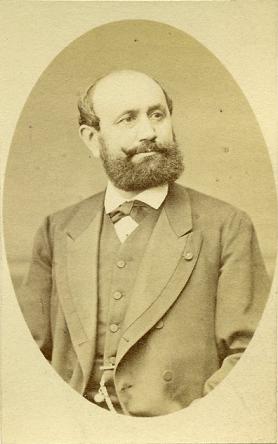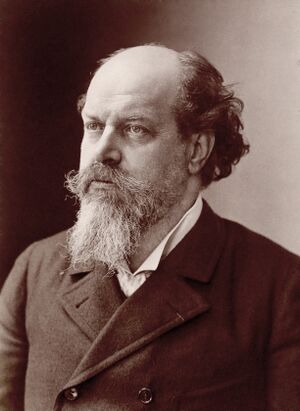La Courtisane
La Courtisane, also known as Sadia, was the subject of a projected French opera (TH 231 ; ČW 462), which Tchaikovsky considered between October 1888 and March 1891.
During the summer of 1888, the French librettists Léonce Détroyat and Louis Gallet wrote to Tchaikovsky, suggesting a number of subjects for operas which could be produced at the Paris Opéra Theatre. Amongst the subjects they proposed were La Géorgienne (after a story by an unidentified French author), Victor Hugo's Marion Delorme, and Mephistophela (based on Heine's Der Doktor Faust). None of these proved satisfactory, but in September of that year Tchaikovsky himself suggested to Détroyat a subject for their joint French-language opera: Goethe's ballad Der Gott und die Bajadere [1].
This poem about the redemption of a bayadere, that is a Hindu dancing-girl, through the steadfastness of her love for the god who assumes human form to test her, clearly appealed to Tchaikovsky, who had already given some thought to the subject because earlier that year Ippolit Shpazhinsky (his librettist for The Enchantress) had drawn up for him a scenario for an opera The Bayadere on the basis of Goethe's ballad. That project had been discarded in favour of the ballet The Sleeping Beauty, a commission from the Imperial Theatres, but Tchaikovsky probably realised that the subject of Der Gott und die Bajadere would be ideal for the French stage, where oriental-themed operas had been all the rage for some time.
Détroyat was immediately captivated by the idea, and already by mid/late October 1888, he and Louis Gallet, whose collaboration he had enlisted, were able to send Tchaikovsky a draft scenario. To avoid comparisons with Auber's opera-ballet Le Dieu et la bayadère (1830), the ever-resourceful Détroyat had decided to turn the heroine, Sadia, into a singer. The opera's title was to be Sadia, ou La Courtisane. On 28 October/9 November, Tchaikovsky replied that "I think it is flawless, and it will give me great pleasure to write the music, as soon as you have turned the contents of this delightful scenario into verse" [2].
Tchaikovsky's diaries show that he met with Détroyat in Paris on 22 March/3 April 1889 [3], and one week later he informed his nephew Vladimir Davydov that "It is decided that I will write the French opera La Courtisane" [4].
Tchaikovsky received the libretto of Act I in July 1889. "It is truly remarkable"', Tchaikovsky replied on 17/29 July, "it has movement, it has poetry — and it is not too long or verbose... I have just finished a large work, and I do not wish to take up another before the autumn. Everything depends on the spirit in which I find myself, and the number of things I have to do... Without being too over-confident, I think that I could have the full score ready for you by the end of summer 1890" [5]. Yet Tchaikovsky did not start work on the new opera, and in January 1890 he turned to Pushkin's The Queen of Spades instead. It appears that this was largely because Détroyat and Gallet could not guarantee that La Courtisane would be performed in Paris [6].
After completing The Queen of Spades, Tchaikovsky was reluctant to undertake a new opera too soon, but Détroyat kept pressing him to honour his earlier promises and insisting that he had found a theatre in Paris which would stage La Courtisane. The situation became so unpleasant for Tchaikovsky that he asked his friend Lucien Guitry to go and speak with Détroyat on his behalf when the actor was on holiday in Paris in the summer of 1890. It seems, though, that to avoid upsetting Détroyat, Tchaikovsky assured him, in September, that he would compose the music for Sadia by the end of the following year [7].
On 6/18 January 1891, Tchaikovsky wrote an apologetic letter to Louis Gallet: "I have not yet written a note of this score, and God knows when I will be able to make a start. I am tormented by the idea that perhaps I have abused your good offices and M. Détroyat's patience. I have often written to him of my desire to retire my dear Sadia, and give her to a French musician who would be no little blessed to have such an invaluable libretto, but Monsieur Détroyat replied that he would not hear a word of it" [8]. He added that because of his agreement to write Iolanta and The Nutcracker for the Imperial Theatres in Saint Petersburg, it would not be possible to do any work on the opera for the foreseeable future. Writing from Paris on 11/23 January 1891, Gallet undertook to explain this to Détroyat and also to urge him to find a theatre in Paris that would actually commission the score of Sadia from Tchaikovsky [9]. Gallet, however, also left the option open for Tchaikovsky to pull out of the project at any point, and it seems that this is what happened when the composer met up with both Gallet and Détroyat in Paris in March 1891 and they decided to abandon their joint project.
No musical sketches by Tchaikovsky for Sadia are known to exist either, and indeed Modest in his biography of the composer pointed out that "this opera was never even begun" [10].
Notes and References
- ↑ Tchaikovsky's letter to Détroyat with this suggestion has not come to light, but from Détroyat's reply to him from Paris on 29 August/10 September 1888 it is clear that the original idea was Tchaikovsky's.
- ↑ Letter 3712a to Léonce Détroyat, 28 October/9 November 1888.
- ↑ Дневники П. И. Чайковского (1873-1891) (1923), p. 231.
- ↑ Letter 3830 to Vladimir Davydov, 29 March/10 April 1889.
- ↑ Letter 3905a to Léonce Détroyat, 17/29 July 1889.
- ↑ See letter 4166 to Modest Tchaikovsky, 4/16 July 1890.
- ↑ Again, this letter from Tchaikovsky to Détroyat, sent from Tiflis in September 1890, has not survived, but its contents may be deduced from Détroyat's reply to him on 22 September/4 October 1890, published in Чайковский и зарубежные музыканты, p. 123.
- ↑ Letter 4288a to Louis Gallet, 6/18 January 1891.
- ↑ See Paris vaut bien une messe! Bisher unbekannte Briefe, Notenautographie und andere Čajkovskij-Funde (1998), p. 255–256. However, in a recently discovered letter (Letter 4739a) Tchaikovsky enquired of Gallet as late as 23 July/4 August 1892: "Would you be so extremely obliging as to resume the versification of La Courtisane, of which I shall be impatiently awaiting Acts II and III!".
- ↑ Modest Tchaikovsky, Жизнь Петра Ильича Чайковского, том 3 (1997), p. 274, note 2.


